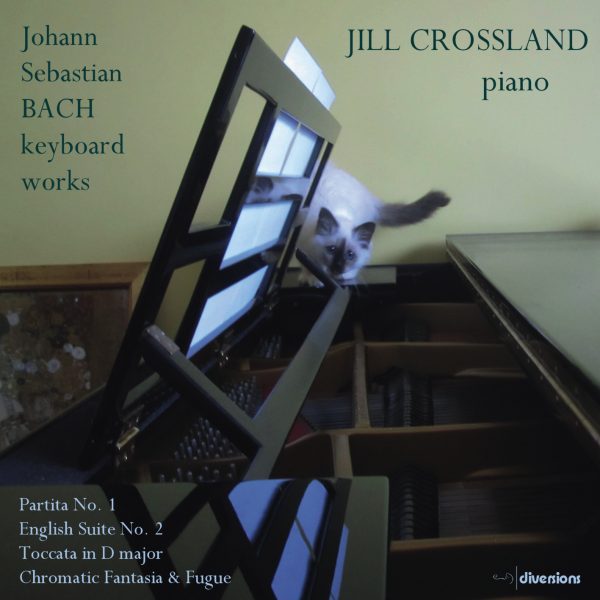Fanfare
Pianist Jill Crossland is featured in a newly released Diversions CD, Johann Sebastian Bach Keyboard Works. The recording, made in March of 2003 at the Old Granary Studio, Beccles, Suffolk, UK, was originally issued on the Calico Classics label. I have not previously heard that disc, and the Fanfare Archive do not indicate any reviews of the original release. In any event, this is a lovely and captivating release, and I am delighted to make its acquaintance. From a technical perspective, Crossland’s playing is beyond reproach. The passagework is executed with the utmost precision and clarity. The various musical lines are always exquisitely balanced.
As an interpreter, Crossland offers an intriguing synthesis of styles and approaches that defies easy categorization. Crossland never attempts to play her Steinway concert grand in a manner that suggests the harpsichord of Bach’s day. Nonetheless, the characteristic sonority is one of lightness and elegance. Even the climax of the concluding Fugue of BWV 903, while embodying concentration and impact, does not seek to shake the rafters. Crossland’s flexibility of phrasing harks back to an older school of Bach playing. Such an approach is most evident in the opening Fantasia of BWV 903, but it is evident throughout all of the works on this disc. Movements typically conclude with a noticeable (and to my ears, satisfying) expansiveness. In the numerous movements of the English Suite, BWV 807, and Partita, BWV 825, that include repeats, Crossland prefers to find variety in repetitions through the subtle application of changes of articulation, dynamics, and phrasing, rather than via ornamentation. One exception is the beautifully decorated Sarabande of BWV 807.
The featured English Suite and Partita abound with dance movements, but the spirit of the dance may also be found in the Toccata, BWV 912, and aforementioned Chromatic Fantasia and Fugue. Crossland invariably finds just the right pacing, articulation, and pulse to give such moments arresting life, even those cast in slower tempos. Crossland’s approach to Bach (at least on this occasion) might not satisfy HIP purists. For that matter, it may not be to the tastes of those who prefer a more full-blooded, Romanticized view of the Baroque composer. But it is Bach playing of arresting technical mastery, aligned with a keen and sensitive musicality that, to my ears, celebrates the genius and beauty of the composer’s vision. The recorded sound is excellent, complementing Crossland’s synthesis of elegance, intimacy, and tonal beauty. There are informative liner notes from Ying Chang, as well as an artist bio. An exquisite disc, highly recommended.
@divineartrecordingsgroup
A First Inversion Company
Registered Office:
176-178 Pontefract Road, Cudworth, Barnsley S72 8BE
+44 1226 596703
Fort Worth, TX 76110
+1.682.233.4978












